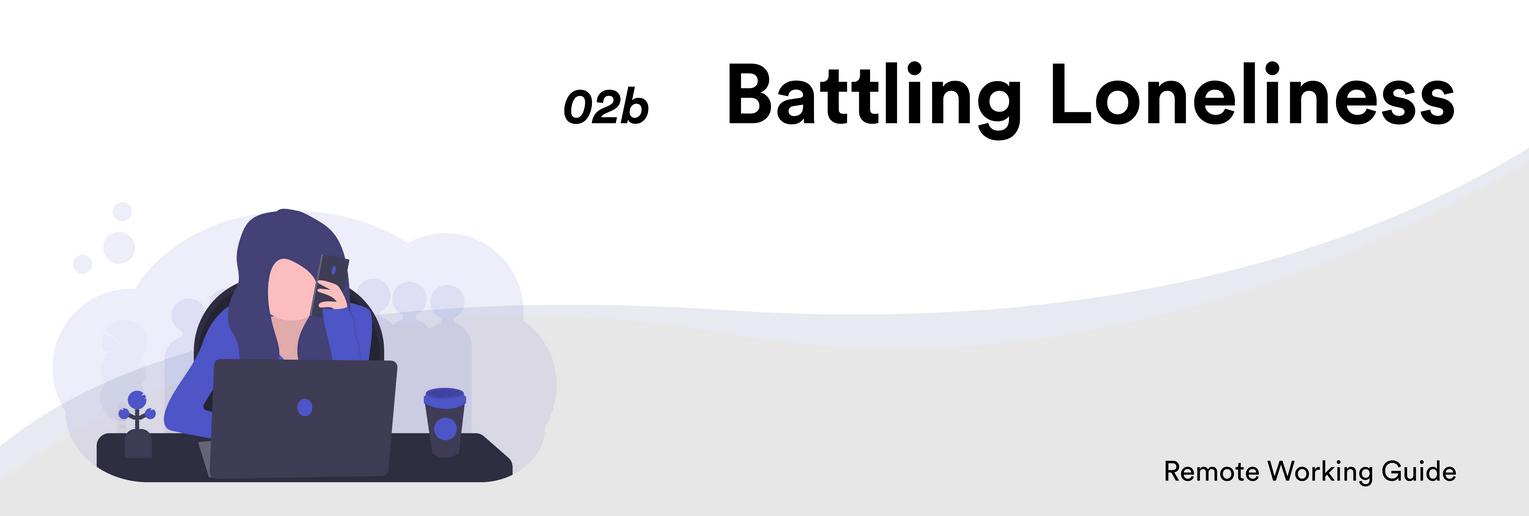
# Fighting loneliness
"Remote work is for introverts as they don't like interacting with others anyway". I have heard this from a few individuals. Nothing could be further from the truth 😷. Fighting loneliness is common to all.
We, as humans, are social beings. Some of us might not acknowledge the need for human interaction or even like it as a concept. However, it is clear that irrespective of our personality types, we require it. Thus, fighting loneliness becomes a necessity while working remotely.
# Popular misconception of the remote working lifestyle
Borrowing from stats from the previous section: 27% feel that loneliness is one of their main problems as a result of working remotely. Further, an equal proportion of individuals (27%) are unable to separate work from their personal life, leading to a further deterioration of mental health.
However, the popular concept of remote work is to be at a beautiful locale sipping on a Piña colada 😂! Of course, working remotely allows one to be location independent, which is not possible otherwise. Those with the travel bug get the opportunity to dip into their passion. But, for all the first-time remote workers out there, we need to look at this "desirable" lifestyle with better perspective.
In this context, I can't recommend Amir's (CEO of Doist) blog on mental wellbeing (opens new window) enough. He mentions how he packed up his stuff and ventured on a trip to Taiwan with just a one-way ticket in the immediacy of breaking up with his girlfriend. The idea was to realise a typical traveler's dream. To quote his experience:
"At the time, I had no idea that this would be the start of the unhappiest period of my life. For the record, ending a long-term relationship and moving away from family, friends, and any other meaningful human connection you might have in the world is a terrible idea. Couple that with a non-existent work-life balance, and you have an excellent recipe for misery."
# Takeaways from Doist's initiatives
A few clear next steps towards fighting loneliness for all remote workers are listed below:
Acknowledge the challenge: Mental health challenges accompanying remote work are for real and it is high time we openly acknowledge them.
Build an open environment: It's easy to assume everything's ok when you don't see or meet your coworkers. There is a need to create an environment that encourages open conversations around this.
Support your co-workers: It is important to support your co-workers who are having problems with depression, anxiety or stress.
Inculcate it in your company's culture: The company's culture needs to reflect concrete steps that support mental wellbeing e.g. Doist has coworking perks and sick days for mental health. Below is a screenshot of the utilisation of such a policy!

# Some personal initiatives for fighting loneliness
At a personal level, to ensure that you continue to remain mentally super-fit, below are some steps that you can take:
- Clear work area & timings: Establish a clear workspace, be it at your house or otherwise. Unclear lines of work space and personal space result in a total mess of work-life balance. While your timings can be flexible, most remote workers we have spoken to agree that having a regular cadence of working hours, helps in better productivity and structure in their lives. So, it is better to choose a standard set of work hours most convenient to you.
"With my current role at Coda, I am still working remotely in NYC but there is a little more structure to my day (which I like). I definitely appreciate the nomadic lifestyle, but it’s not something I could do for a month or year. Having a weekly cadence to my meetings and projects does give me a sense of stability and also keeps me “plugged in” with the rest of my team on the west coast.
- Al Chen, Solutions Architect and Evangelist at Coda.io
Indulging your passion: As seen in the tweet by Allan Kjellstrøm Christensen, COO - Doist (opens new window), allocating time for and diving deep into your passions allows you to recover mentally. It could be pottery, music, gardening or the like - anything that interests you, can have a great calming effect!
Co-working spaces: While a home office works just fine, it is still just you alone in a room. Moving out of your home and into a co-working space allows you to meet other people. While you don't have to and likely wouldn't be talking to them all the time, you still get access to "coffee breaks", otherwise absent at home. Even if you work out of a home office, occasionally going to a co-working space or even a coffee shop to work might be extremely refreshing 😋!
"I have worked in an office from home for about a year, but it indeed got lonely. My world felt very small, even though I have a family with (at the time) 1 kid, and even though I had weekly hangouts with my client. Then, I ran into a co-working space, or hub, where many freelancers work "together" in a kind of open plan office. It's not that we talk all the time, the interaction with other people is quite minimal, yet it makes all the difference. That place is now gone, because the building got demolished, but I've found a similar spot. In this place we also have lunch together, and that's an awesome way to be forced to stop working for a bit and socialize. Would prefer it over a home office (or any 1-person office) anytime 😄
- Almar Klein, Co-founder, TimeTurtle.app
- Networking events: These could be events to build your skillsets or just a group of like-minded people getting together. Either way, it is a great outlet to breaking the monotony of working alone and also learning a few new things along the way!



